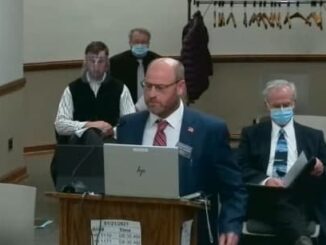
The following article was published with the permission of its author, Rep. Marvin Nelson (D – District 9).
It was originally posted to Rep. Nelson’s Facebook page earlier today.
The fight over the Auditor’s office has been in the news constantly since the legislative session. I have served on the Audit and Fiscal Review committee for four sessions and I’ve been impressed by the Auditor. He has even informed the Audit and Fiscal Review Committee about “tips” he has received about things that, if true, would be improper. Informing the committee has certainly increased from previous years. It seems not everyone has been happy.
The problems with the Auditor’s budget began with the Governor’s budgeting process. Almost all agencies were supposed to come in with a proposal for the same level of cuts without regard to the state’s financial situation nor the effects on that agency. Very small agencies and those with large amounts of federal funding were treated differently, but it was by and large a one size fits all process. The Auditor had to come in with proposed cuts when cutting really didn’t make sense or shrink government, cuts just removed oversight and likely would increase government waste over time.
The Governor’s budget eliminated two positions, one state and one local auditor in the eastern part of the state and added two local government auditors in Bismarck from special funds. It also underfunded salaries by a significant amount, about ¾ million.
I should note that agencies are not charged for audits of general funds but they are for special funds. They are also not charged for performance audits. Local subdivisions are charged, but according to what people say it is about half of what they end up paying for private auditors. Not long ago the Auditor’s office did almost all subdivision audits but that was ended under a previous administration. Some don’t seem to like the Auditor doing local audits, they seem to see it as competing with the private sector. An example where shrinking government costs taxpayers.
An audit of special funds found several agencies were paying those fees with general fund dollars. This is consistent with a pattern the audit found where agencies were spending general funds and sitting on special funds. The audit revealed the state had no real policy concerning the accumulation or use of special funds.
So right from the start, the Governor’s budget would have largely eliminated this type of useful information. While the Governor’s budget isn’t the starting point anymore for bills, it is present in the Appropriations Committee in what is called the green sheet and seems to have exerted a lot of influence.
The bill started in the Senate and they added positions but still did the proposed underfunding. The House eliminated the underfunding but followed the Governor’s proposal to eliminate two positions and add two local government positions in Bismarck. In all cases, I believe performance audits were going to be eliminated or at least extremely limited due to a lack of personnel or resources to do them. I voted against the bill the first time it passed the House.
A lot of hallway discussions on the Auditor’s budget took place.
In conference committee, the two positions were added back but the now famous clause requiring approval by the Audit and Fiscal Review Committee was added. This was in my opinion a big step up from the previous versions even with the encroachment on the executive powers of the Auditor. At least any prevention of audits required a public vote such as when the committee stopped the audit of the university development foundations a biennium ago.
Changes in policy are supposed to happen in policy committees, but that didn’t happen in this case, and conference committees are supposed to limit themselves to areas of disagreement between the two versions of the bill, but that didn’t really happen either. While the limiting of performance audits was in all previous versions, the clause made it more obvious.
I was expecting a line item veto, after all the Governor had vetoed and gone to court over the use of the Budget section between sessions in an executive capacity, and this used a different committee as an executive, but that didn’t happen. Seems like about the first place the Governor and Legislature cooperated was in limiting the Auditor. So now they are talking a special session.
The green sheet for the Auditor’s budget.
Editorial Note: For full disclosure, Rep. Nelson ultimately voted in favor of SB 2004— after being the lone vote against it the first time it came through the House. Publication of this article is obviously not an endorsement of the final vote. But we felt that his explanation of developments regarding the bill provided valuable insight into the overall situation regarding the State Auditor.
PLEASE LIKE & SHARE!
Sources:
- https://www.facebook.com/NDrepmarvinenelson/
- https://www.legis.nd.gov/files/fiscal/2019-21/docs/117eb.pdf?fbclid=IwAR0wpcx_l-sNUlFnjZmDGn5x7-2-CQdPXycxd2Qhaflz0HSunj1f2z0mFp0





